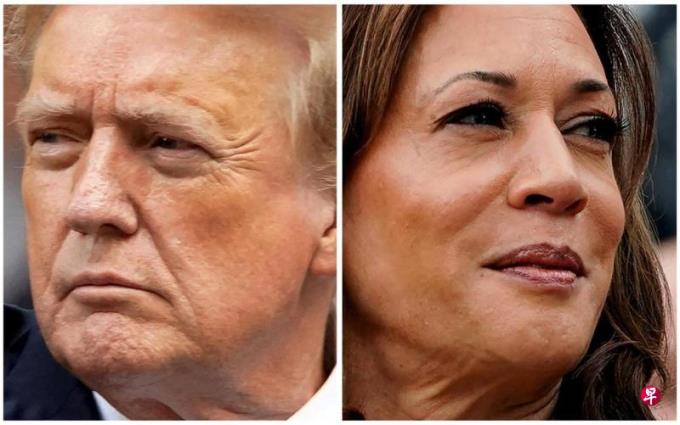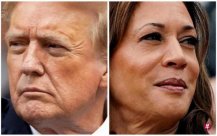
Whether it is Vice President Harris or former President Trump won the November Presidential Election, this result will undoubtedly have a far -reaching impact on American political climate.However, due to Trump's lack of interest in policies, and the Harris campaign team is trying to transfer people's attention to rising food prices during Biden's ruling, how much impact will the results of the general election have a lot to say.
So far, the financial market has basically been indifferent to the general election.This may be because investors believe that whether it is Harris or Trump, they cannot ensure the control of the two houses of the Parliament, thereby restricting their ability to formulate meaningful legislation.Because the polls and the gaming market predict that the results of the elections are abnormally close, there are reason to believe that the political deadlock is the most likely result.But is this really the case?In my opinion, the probability of the Democratic Party's victory is increasing, and investors should pay attention to it.
Since Biden ended his re -election and Harris began to rise, Republicans, or more accurately, seem to be playing chess, and Democrats are chess in Western.Although there are many keen strategists in the Republican Party, the party's leaders either ignore their suggestions or lack enough attention to implement it.
In contrast, the Democratic party's campaign is extremely rigorous. Harris basically does not accept media interviews, nor does it participate in any pre -arrangement activities. The only exception is her CNN who is very agreed with her on August 29th.The reporter's discussion, while the campaign partner Walz was present.It turns out that Harris's strategy is very effective. She shows her charm and energy in a carefully prepared speech, and easily withstand the pressure in the first interview.Trump, who has dominated the news circle for 10 years, found that he had been marginalized and could only try to regain the public's attention.
If the Democratic Party has won the White House, holds the Senate, and seizes the House of Representatives, Harris will promulgate a comprehensive economic reform.Just as the Democrats have vowed to do many times, the revocation of the rules of the Senate's obstructive procedure will make her government ignore the Republican opposition even with a weak majority.Although this strategy will undoubtedly laid the same way for Republicans to take the same means when they finally take power, which may cause long -term turbulence, but the Democratic leadership seems to be worried about this.
Nevertheless, obtaining control of administrative and legislators will enable Harris and Democrat) S $ 480 billion) and the increasing long -term debt issues.Harris has proposed to increase taxes on the rich and enterprises in order to create a new revenue of $ 5 trillion in the next 10 years, but if you do not increase the deficit, or if you do not violate the annual income of less than 400,000 US dollars, the tax increase commitment is increased by tax increase commitment.It is extremely difficult to implement her ambitious progress plan.Although Harris said that she hopes to "turn over" Trump and US politics in the past 10 years, but she does not explicitly explain what the next chapter may look like.
Of course, Trump also put forward tax increase suggestions, although it is generally levied 10%of import tariffs and a 60%tariff on Chinese goods.In view of the value of imported goods by US imports in 2023, this approach can indeed bring considerable income.It is worth noting that tariffs are common in developing countries with weak taxation systems.
However, the contrary to Trump's statement, the tariffs he proposed, although technically levied to foreign companies, will eventually lead to higher prices and most costs of American consumers.In addition, other countries will inevitably take revenge, thereby further pushing the cost of imported goods.
Trump and Harris seem to be not interested in reducing deficits.Harris's economic plan contains several high costs, such as restoring the children's tax credit credit policy for Biden's government, and providing subsidies for the first home buyers.Considering the background of Harris as California's progressive Democrats, people suspect that her expenditure agenda will eventually exceed these preliminary suggestions.
Trump promised to reduce taxes for everyone, and vowed not only to allow the social security benefits of low -income retirees to be tax -free, but also provided the rich people with tax -free social security benefits; the rich tax rate was higher, so it benefited the most.This approach is of course reckless.
On the Federal Reserve, the comparison between the two candidates is even more obvious.Harris promised to respect the independence of the Federal Reserve, but she may appoint some pigeon officials who tend to maintain low interest rates, and even risk the risk of rising inflation.Trump suggested that the president should have a "right to speak" in the Fed's discussion, which allows people to return to the era before the central bank's autonomy.Considering the tendency of Trump's monopoly dialogue, people can't help but ask other people if there is a chance to speak.
The ideal situation is that both sides will not obtain the power to implement their will in the November election.But if one party finally controls the White House and the House of Representatives, the Democratic Party is much greater than that of the Republican Party.Although any victory in Harris will benefit the soul of the United States, what this means for the US economy is far from being so clear.
Author Kenneth Rogoff is former chief economist of the International Monetary Fund, a professor of economics and public policy at Harvard University
English Original: Harris Plays Chess While Trump Plays Checkers
All rights reserved: Project syndicate, 2024.




